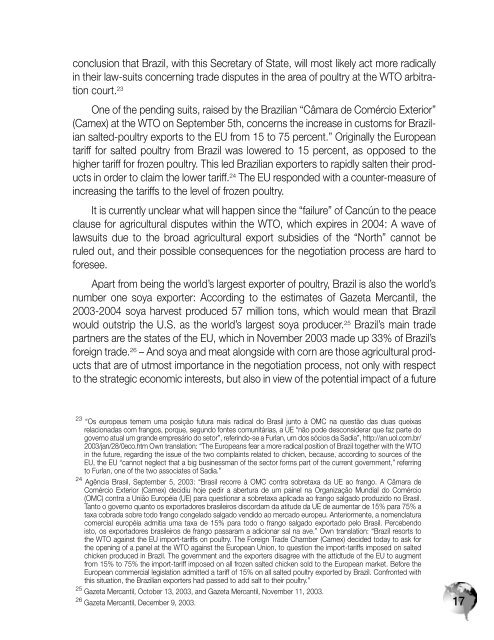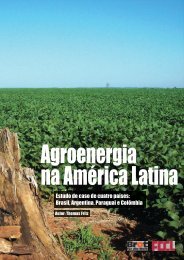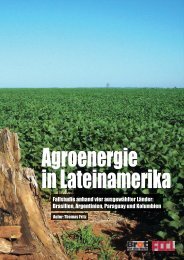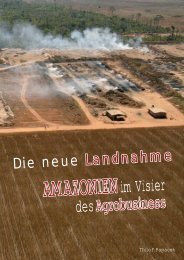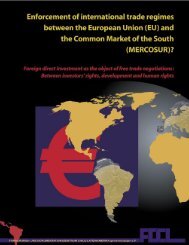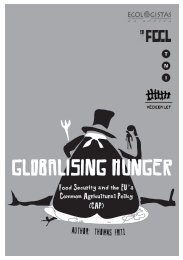Download - FDCL
Download - FDCL
Download - FDCL
You also want an ePaper? Increase the reach of your titles
YUMPU automatically turns print PDFs into web optimized ePapers that Google loves.
conclusion that Brazil, with this Secretary of State, will most likely act more radically<br />
in their law-suits concerning trade disputes in the area of poultry at the WTO arbitration<br />
court. 23<br />
One of the pending suits, raised by the Brazilian “Câmara de Comércio Exterior”<br />
(Camex) at the WTO on September 5th, concerns the increase in customs for Brazilian<br />
salted-poultry exports to the EU from 15 to 75 percent.” Originally the European<br />
tariff for salted poultry from Brazil was lowered to 15 percent, as opposed to the<br />
higher tariff for frozen poultry. This led Brazilian exporters to rapidly salten their products<br />
in order to claim the lower tariff. 24 The EU responded with a counter-measure of<br />
increasing the tariffs to the level of frozen poultry.<br />
It is currently unclear what will happen since the “failure” of Cancún to the peace<br />
clause for agricultural disputes within the WTO, which expires in 2004: A wave of<br />
lawsuits due to the broad agricultural export subsidies of the “North” cannot be<br />
ruled out, and their possible consequences for the negotiation process are hard to<br />
foresee.<br />
Apart from being the world’s largest exporter of poultry, Brazil is also the world’s<br />
number one soya exporter: According to the estimates of Gazeta Mercantil, the<br />
2003-2004 soya harvest produced 57 million tons, which would mean that Brazil<br />
would outstrip the U.S. as the world’s largest soya producer. 25 Brazil’s main trade<br />
partners are the states of the EU, which in November 2003 made up 33% of Brazil’s<br />
foreign trade. 26 – And soya and meat alongside with corn are those agricultural products<br />
that are of utmost importance in the negotiation process, not only with respect<br />
to the strategic economic interests, but also in view of the potential impact of a future<br />
23 “Os europeus temem uma posição futura mais radical do Brasil junto à OMC na questão das duas queixas<br />
relacionadas com frangos, porque, segundo fontes comunitárias, a UE “não pode desconsiderar que faz parte do<br />
governo atual um grande empresário do setor”, referindo-se a Furlan, um dos sócios da Sadia”, http://an.uol.com.br/<br />
2003/jan/28/0eco.htm Own translation: “The Europeans fear a more radical position of Brazil together with the WTO<br />
in the future, regarding the issue of the two complaints related to chicken, because, according to sources of the<br />
EU, the EU “cannot neglect that a big businessman of the sector forms part of the current government,” referring<br />
to Furlan, one of the two associates of Sadia.”<br />
24 Agência Brasil, September 5, 2003: “Brasil recorre à OMC contra sobretaxa da UE ao frango. A Câmara de<br />
Comércio Exterior (Camex) decidiu hoje pedir a abertura de um painel na Organização Mundial do Comércio<br />
(OMC) contra a União Européia (UE) para questionar a sobretaxa aplicada ao frango salgado produzido no Brasil.<br />
Tanto o governo quanto os exportadores brasileiros discordam da atitude da UE de aumentar de 15% para 75% a<br />
taxa cobrada sobre todo frango congelado salgado vendido ao mercado europeu. Anteriormente, a nomenclatura<br />
comercial européia admitia uma taxa de 15% para todo o frango salgado exportado pelo Brasil. Percebendo<br />
isto, os exportadores brasileiros de frango passaram a adicionar sal na ave.” Own translation: “Brazil resorts to<br />
the WTO against the EU import-tariffs on poultry. The Foreign Trade Chamber (Camex) decided today to ask for<br />
the opening of a panel at the WTO against the European Union, to question the import-tariffs imposed on salted<br />
chicken produced in Brazil. The government and the exporters disagree with the attidtude of the EU to augment<br />
from 15% to 75% the import-tariff imposed on all frozen salted chicken sold to the European market. Before the<br />
European commercial legislation admitted a tariff of 15% on all salted poultry exported by Brazil. Confronted with<br />
this situation, the Brazilian exporters had passed to add salt to their poultry.”<br />
25 Gazeta Mercantil, October 13, 2003, and Gazeta Mercantil, November 11, 2003.<br />
26 Gazeta Mercantil, December 9, 2003.<br />
17


